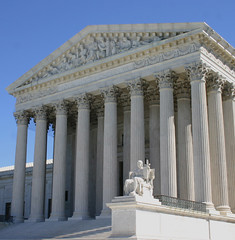 By Michael D. Peabody, Esq. – For over 25 years, the legal system has grappled with the question of what constitutes prima facie discriminatory conduct under Title VII of the Civil Rights Act. Courts across the nation have established different standards for prima facie discrimatory conduct and there have been no clear-cut answers. Sixth Circuit Court of Appeals said that a person has established a prima facie claim of adverse discriminatory action only after an employee is formally disciplined or are discharged from employment, while the Ninth Circuit has ruled that even an implicit threat to discipline is sufficient.
By Michael D. Peabody, Esq. – For over 25 years, the legal system has grappled with the question of what constitutes prima facie discriminatory conduct under Title VII of the Civil Rights Act. Courts across the nation have established different standards for prima facie discrimatory conduct and there have been no clear-cut answers. Sixth Circuit Court of Appeals said that a person has established a prima facie claim of adverse discriminatory action only after an employee is formally disciplined or are discharged from employment, while the Ninth Circuit has ruled that even an implicit threat to discipline is sufficient.
Given the disparity between the Circuits, it was anticipated that the Supreme Court would weigh in on the issue. However, on April 5, 2010 the United States Supreme Court declined to hear the case of Jeffrey Reed v. International Union, United Automobile, Aerospace and Agricultural Implement Workers of America which involved a challenge to a United Auto Workers (UAW) unionization policy. Reed argued that the policy requiring employees who objected to joining labor unions on religious grounds to pay more in dues than union members or those who objected on secular grounds was discriminatory and violated the reasonable accommodation provisions of Title VII.
In the case before the Court, Jeffrey Reed was an assembler for AM General, and as part of the contract between the employer and the United Auto Workers (UAW), Reed was required to either join the union or pay dues if he wanted to remain employed. Some union contracts require those who do not wish to join a union to pay an equivalent amount to a non-religious charity approved by the union. Because of Reed’s belief that the UAW supported activities conflicting with his sincerely held religious beliefs, Reed applied for a religious accommodation that would allow him to make an alternative payment to a charity, Disabled American Veterans.
There are two major portions to union fees – political costs, and costs of negotiation. The UAW constitution gives union members the right to object to the political portion of the dues and receive a rebate of that amount, and non-union members can refrain from paying the portion devoted to political activities. They still have to pay the equivalent amount for the cost of negotiations. The UAW calculates that about 22% goes to politics, the remainder to the union for routine administrative costs, negotiation, etc.
While waiting for the union to approve his request for religious accommodation, Reed made payments of 78% of the union fees. However, the union then required him to come up with the additional 22% after it agreed to accommodate him. If he was anything other than a religious objector, paying 22% less would not have been an issue.
He filed a complaint with the Equal Employment Opportunity Commission (EEOC), which found cause to believe that the UAW had refused a reasonable, non-discriminatory accommodation, of Reed’s sincerely held religious belief.
However, the Sixth Circuit Court of Appeals panel decided that because Reed had not been fired or disciplined because of his beliefs, there was no need to consider the reasonableness of the accommodation. Further, the lower court found that he had not been discriminated against because many union member voluntarily paid 100% of dues anyway.
The Sixth Circuit’s opinion requiring evidence of discharge or discipline differs significantly from the requirements in other districts. For instance, the Ninth Circuit allows a prima facie religious accommodation claim to be established by showing a threat of an adverse employment action. This threat can be implicit. Disparities between the circuits have led to a scenario in which the religious discrimination provisions of Title VII are not uniformly or consistently applied across the nation.
Because of the broader implications of his case, the Seventh-day Adventist Church and Southern Baptist Convention and others requested that the United States Supreme Court make a decision on this case. In an amicus brief, jointly submitted on January 19, 2010, attorneys Charles Kester and Todd McFarland requested that the Court hear the case so that it could “eliminate the conflict among the circuits over what an employee of faith must prove to claim a religious accommodation, and to provide guidance to the lower courts, employers and persons of faith as to what forced choices are proscribed by Title VII.”1
There have been attempts to pass legislation that would promote more uniform application of Title VII to workplace religious discrimination scenarios. A clarifying legislative solution may be the best answer for all involved, and we will continue to watch developments in Congress and in the Courts along these lines. In the meantime, employers, employees, and labor unions across the nation can only hope for the best as they face a process of trial and error in dealing with these issues.
Special thanks to Bruce Cameron, Reed Professor of Law at Regent University, for bringing this story to our attention.
###
1 BRIEF OF AMICI CURIAE GENERAL CONFERENCE OF SEVENTH-DAY ADVENTISTS AND THE ETHICS & RELIGIOUS LIBERTY COMMISSION OF THE SOUTHERN BAPTIST CONVENTION IN SUPPORT OF PETITION FOR WRIT OF CERTIORARI OF PETITIONER JEFFREY J. REED
Further Reading:
Michigan Worker Asks U.S. Supreme Court to Halt UAW Policy of Religious Discrimination
Holding: The Supreme Court declined to hear a challenge to a UAW policy requiring employees who objected to joining labor unions on religious grounds to pay higher dues than union members or secular objectors.